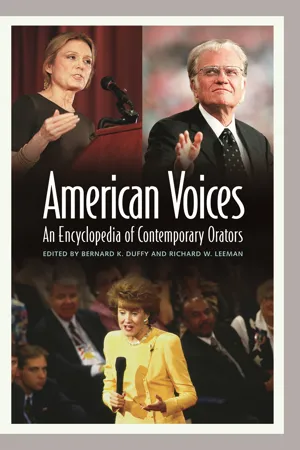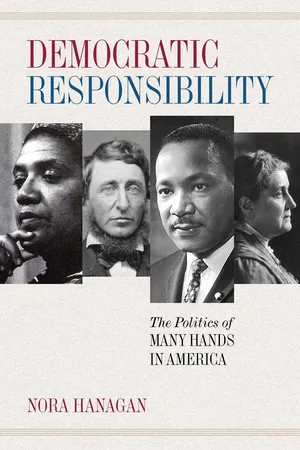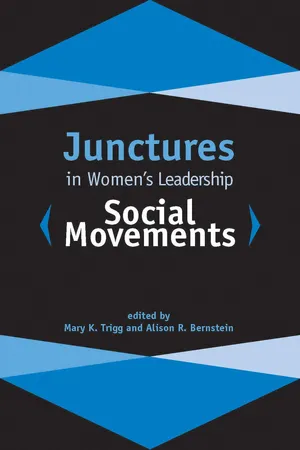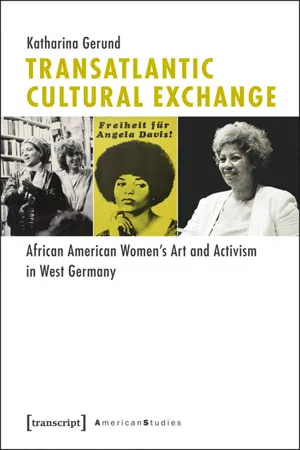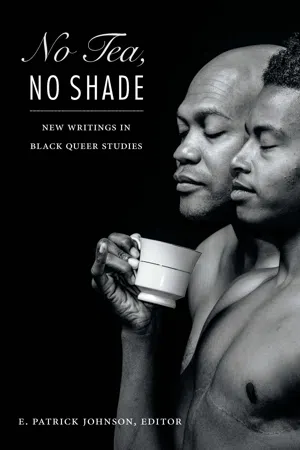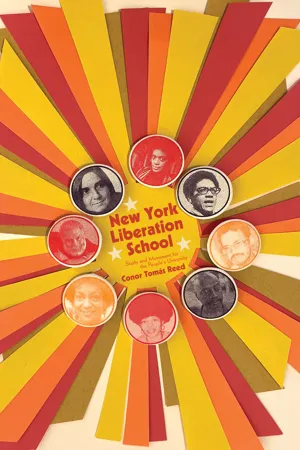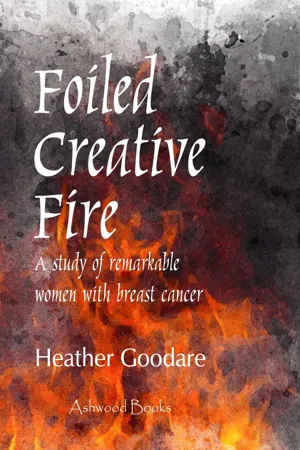Politics & International Relations
Audre Lorde
Audre Lorde was a prominent African American writer, feminist, and civil rights activist. She is known for her powerful writings on race, gender, and sexuality, and for her advocacy of intersectional feminism. Lorde's work emphasized the importance of embracing differences and confronting systems of oppression, making her a significant figure in the fight for social justice and equality.
Written by Perlego with AI-assistance
Related key terms
1 of 5
7 Key excerpts on "Audre Lorde"
- eBook - PDF
American Voices
An Encyclopedia of Contemporary Orators
- Bernard K. Duffy, Richard Leeman, Bernard K. Duffy, Richard Leeman(Authors)
- 2005(Publication Date)
- Greenwood(Publisher)
Audre Geraldine Lorde (1934-1992) 285 AUDRE GEBALDINE LORDE (1934-1992) Professor of* English\ Poet, Black Lesbian, and Socialist LESTER C. OLSON Audre Geraldine Lorde was a poet orator whose sensibility as a poet suffused her public speeches throughout her lifetime. She is better known today as a poet of international stature than as a public speaker, essayist, or pamphleteer, even though some of her speeches were brilliant, many have become classics in feminist scholarship, and most are the subject of ongoing controversies. Lorde's oratory focused upon the role of language in com- municating social differences in ways that con- struct relations of power among groups. Her pub- lic speeches, the most important of which were collected in Sister Outsider: Essays & Speeches by Audre Lorde in 1984 and A Burst of Light in 1988, have an aphoristic, expansive quality re- sulting from her extensive use of metaphors, max- ims, proverbs, narratives, and stories to affirm her perspective on the relationship among language, self, and society. Her speeches, like her essays and her poems, often examine human differences communicated within a sociopolitical system of power ranging across symbolic oppositions be- tween white and Black, male and female, capital- ist and socialist, heterosexual and homosexual, master and slave—oppositions that Lorde criti- cized as simplistic and as useful to dominant groups for exploiting subordinated communities. Her public speaking is a vital resource for com- munication scholars engaged in examining the role of language and action in transforming self and society in a diverse culture. Lorde was born on February 18, 1934, in Harlem in New York City. Her parents, Linda Belmar and Frederic Byron Lorde, were immi- grants from Grenada. - eBook - ePub
Democratic Responsibility
The Politics of Many Hands in America
- Nora Hanagan(Author)
- 2019(Publication Date)
- University of Notre Dame Press(Publisher)
While much of Lorde’s political theorizing was focused on changing attitudes that prevent political actors from responding to ascriptive inequalities, she also appreciates that certain institutions were more capable of allowing marginalized people to speak honestly to people in power. In her “Learning from the 60s” lecture, Lorde emphasizes the importance of rainbow coalitions that enable political actors with different experiences of oppression and privilege to work together to address shared responsibilities. The coalitions envisioned by Lorde are less cohesive and more contentious than the ones that Addams and King sought to build. These coalitions, however, are essential to the practice of democratic responsibility in unequal societies. Moreover, as I explain toward the end of this chapter, Lorde teaches us that such coalitions are required on an international as well as domestic level.Though she is often cited by feminist and critical race scholars, Audre Lorde is seldom included in the canon of American political thought. Lorde’s absence may be because she rejected the American democratic experiment wholesale. In a conversation with James Baldwin about the American dream, she declared that “deep, deep, deep down I know that dream was never mine.”2 However, while Lorde may not have embraced American myths and ideals, her political theorizing was profoundly shaped by her experiences as a black lesbian woman who was marginalized by American society and by her frustration at being implicated in the actions of the United States government abroad. Moreover, putting Lorde in dialogue with more canonical American thinkers such as Thoreau and King is fruitful because her ideas about democratic responsibility both echo and improve on theirs.WARRIOR POET
The daughter of Caribbean immigrants, Lorde was born in Harlem during the Great Depression.3 As a black, lesbian, socialist of Afro-Caribbean descent, Lorde felt rejected by mainstream American society. Nor did she feel completely at ease in any of the various subcultures with which she interacted. At lesbian bars in the East Village and at academic feminist conferences, she was often the only black person in the room. At the same time, her sexual orientation and Caribbean heritage made her feel like an outsider in the civil rights movement. She describes identifying with Ethel and Julius Rosenberg as fellow outsiders and viewing their execution as a test of her own ability to “survive in hostile surroundings.”4 She also, however, attributed many of the character traits that made her a successful poet and political activist—such as her willingness to speak her mind—to her struggle to live in a society in which she never felt entirely at home.5 - Mary K. Trigg, Alison R. Bernstein(Authors)
- 2016(Publication Date)
- Rutgers University Press(Publisher)
Audre LordeBlack, Lesbian, Feminist, Mother, Poet Warrior
Kathe Sandler and Beverly Guy-Sheftall BackgroundAbout to turn fifty years old in February 1984, Audre Lorde—the self-described “Black, lesbian, feminist, mother, poet warrior”—inspired a near rock-star following in several social, political, and cultural movements in the United States and abroad. A celebrated writer, activist, and educator, Lorde was among the most revered and visible “out” Black lesbian feminists of her generation. She claimed and affirmed the multiplicity of her identities, arguing that the recognition of differences among all kinds of women and people was central to building progressive communities. Lorde stated, “It is not our differences that divide us. It is our inability to recognize, accept and celebrate those differences.”1As a participant in many radical social justice movements, Lorde developed cutting-edge theory about racial, gender, sexual, and class differences. She maintained that the future of the planet depended on the ability of women throughout the world to work with one another. One of the few Black women actively engaged in socialist lesbian feminist circles, she was also among the very few out lesbians amid a cadre of increasingly acclaimed African American women writers whose writings helped catalyze the modern Black feminist movement.Lorde transitioned into prose writing after publishing many critically acclaimed books of poetry. Her cutting-edge essays articulated poetic and highly accessible feminist and social justice theory. As a breast-cancer survivor, Lorde published The Cancer Journals in 1980, a groundbreaking memoir in which she documented her battle with breast cancer, her struggle to take charge of her own medical care, and her decision not to wear a prosthesis. She broke the culture of silence and erasure about women and breast cancer by openly acknowledging the loss of her right breast and urged other survivors to do the same. She argued that masking her mastectomy with a prosthesis would be detrimental to her well-being, and she encouraged breast-cancer survivors to come together and recognize one another.2- eBook - PDF
Transatlantic Cultural Exchange
African American Women's Art and Activism in West Germany
- Katharina Gerund(Author)
- 2014(Publication Date)
- transcript Verlag(Publisher)
It combines the analysis 162 | T RANSATLANTIC C ULTURAL E XCHANGE of an expanded and revised black diasporic landscape which includes Ger-many with some first thoughts on the implications of viewing the diasporic experience as inherently gendered. A UDRE L ORDE ’ S A RT AND A CTIVISM Audre Lorde defined a very broad audience for her work: “My audience is every single person who can use the work I do” (Kraft, “The Creative Use” 152). Contrary to this claim, Lorde, like other lesbian authors such as Alice Walker, has often been wrongfully regarded as a separatist in her emphasis on women (Christian 789). Margaret Mills Harper, for example, holds that “[t]he characteristic stance of the American poet [Lorde] was separatist and combative” (185). In line with other critics, I propose that Lorde’s work can be read in a more complex light than merely regarding it as the manifesta-tion of an ‘angry black woman’ (though anger was central to her work). I contend that, at close inspection, it emerges as challenging rather than combative and counter-divisive rather than separatist. These characteristics made her work accessible and relevant not exclusively to one specific group like women, black women, or lesbians and enabled it to resonate in different places, contexts, and discourses. In fact, Lorde held that women and above all black women were of particular importance for her and that she “[thinks] of [her] responsibility in terms of women because there are many voices for men” (Tate 104). 7 More precisely, she claimed to write pri-marily “for those women who do not speak, who do not have verbalization because they, we, are so terrified” (“My Words” 161). Lorde sought to em-power herself and others by speaking out and breaking silences; she always expected people and particularly women not only to listen but rather to answer to her call. - eBook - PDF
No Tea, No Shade
New Writings in Black Queer Studies
- E. Patrick Johnson(Author)
- 2016(Publication Date)
- Duke University Press Books(Publisher)
1 7 Re-membering Audre Adding Lesbian Feminist Mother Poet to Black A M B E R J A M I L L A M U S S E R (Black) Woman i came to Audre Lorde through Gilles Deleuze and Frantz Fanon. I wanted to consider the postmodern fragmentation of subjectivity that Deleuze favored and Fanon abhorred through a gendered perspective. Lorde, who frequently began her readings by saying that she was a “woman, a black lesbian feminist mother lover poet,” ofered an entry point into poststructuralism from a very diferent perspective. 1 As I worked through what it means to think about bodies and diference, her theories of selfhood and collectivity were intoxicating. Her concept of the erotic in particular seemed to give answers to urgent political questions: How to attend to diference, but work together for change? How to work through the body while acknowledging structural diference? Yes, Lorde’s words seemed to promise the elusive brown queer utopia that I had been searching for. I am not alone in my admiration of Lorde; the eightieth anniversary of her birth was celebrated by numerous essays and tributes, many of which focused on Lorde’s intellectual and political legacy. Linda Garber writes that Lorde “stands historically and rhetorically at the crux of the so-called generation gap between lesbian-feminist and queer theoretical Re-membering Audre • 347 notions of identity.” 2 In Garber’s description of Lorde as a point of inter-section between diferent historical moments and theoretical orientations, we can begin to understand that this fascination with Lorde has as much to do with her philosophies of community and diference as her role as a forerunner to contemporary queer theory. But lately, I have begun to wonder if claiming Lorde as queer has somehow erased her identity as a black lesbian feminist. This hyphenated identity is more than a means toward upending patriarchy and racism; these identities meant something to Lorde. - eBook - ePub
New York Liberation School
Study and Movement for the People's University
- Conor Tomás Reed(Author)
- 2023(Publication Date)
- Common Notions(Publisher)
118Lorde brought these perspectives back to CUNY at Hunter College, where she taught from 1981 to 1986. Lesbian writer-activist Sarah Schulman, one of her Hunter students at this time, recounted, “Lorde organizing her packed class into one large circle and standing in the center to teach. By the second class, she had learned all the students’ names and as she taught, she would make eye contact with specific students, referencing an idea from their papers or from a previous class discussion.”119 Healing full circle from “Blackstudies” and the academic injuries composited in Deotha, Lorde’s great self-reflexive lesson toward the end of her life was of integrating the different (at times, even conflicting) parts of oneself as a practice for outward coalitional commitments.When Audre Lorde died in 1992 at the age of fifty-eight, and Adrienne Rich twenty years later at the age of eighty-two, they were widely honored as two of the most influential writers of our time. Lorde’s early death was the result of what Ruth Wilson Gilmore has named the entwined “premature death” of racism, sexism, homophobia, ableism, and economic exploitation.120 As Alexis Pauline Gumbs reminds us, Audre Lorde and her Black feminist colleagues, like Barbara Christian and June Jordan, were refused flexible teaching schedules and medical leave to heal from cancer. Their employers—the City University of New York and the University of California—knew that “Black feminists are a trouble more useful as dead invocation than as live troublemakers.”121 Until Rich’s own passing in 2012, she foregrounded Lorde’s legacy in her writing, speeches, and interviews. In one of Rich’s last poems, “Endpapers,” she returns to a guiding intention that poetry can sustain radical communities—I want this to reach you—even as the words begin to disappear: “The signature to a life requires / the search for a method / rejection of posturing / trust in the witnesses / a vial of invisible ink / a sheet of paper held steady / after the end-stroke / above a deciphering flame.”122 - eBook - ePub
Foiled Creative Fire
A study of remarkable women with breast cancer
- Heather Goodare(Author)
- 2020(Publication Date)
- Ashwood Publishing(Publisher)
Audre Lorde
A tribute to Audre Lorde by Jackie Kay in The Guardian of 13th October 2008 ran:Poet, mother, lesbian, feminist, African-American — Audrey Lorde believed in naming the names. She wrote with ground-breaking eloquence about the complexities of identity, and was convinced that silence was the greatest enemy. 1She was born on 18th February 1934 in New York, and given the name Audrey Geraldine Lorde, though at the age of four she insisted on changing ‘Audrey’ to ‘Audre’, so making two words symmetrically ending in ‘e’.Her parents were both from the Caribbean, her mother Linda from the small island of Carriacou and her father Byron from Barbados. Her mother was lighter-skinned than her father; she herself was the darkest of the three children: she had two older sisters, Helen and Phyllis. Her early childhood was problematic: her eyesight was extremely poor, and it was only at the age of four that she was equipped with spectacles. Even then, her parents disapproved of sunglasses, and bright light caused her great discomfort in summer. Her relationship with her parents was difficult and distant: the first indication that her emotional life was to be fraught. She started writing poetry at an early age. A positive influence from her mother was the importance to her of green things, especially trees and water in parks. But:Being black and foreign and female in New York city in the twenties and thirties was not simple, particularly when she was quite light enough to pass for white but her children weren’t.2Corporal punishment was routine in the household. At the age of five, in September 1939, Audre started at the Catholic school attended by her older sisters. She wrote in Zami:
Index pages curate the most relevant extracts from our library of academic textbooks. They’ve been created using an in-house natural language model (NLM), each adding context and meaning to key research topics.
